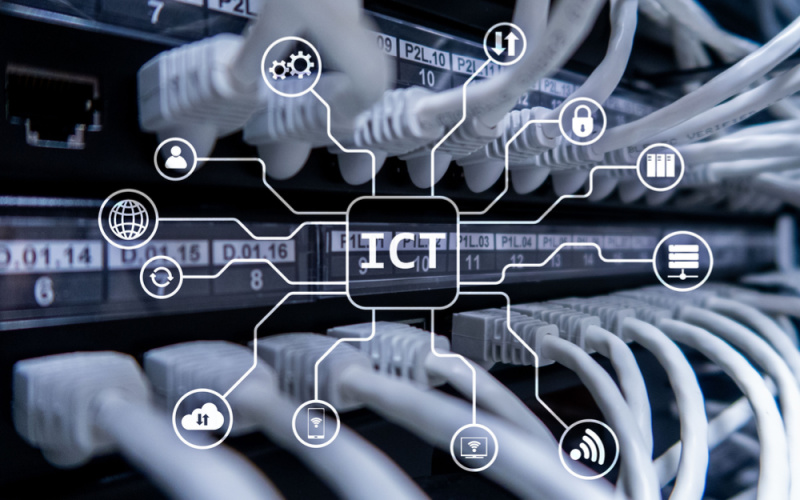Information communication technologies: policies, practices and trends
Posted on: December 15, 2023by Ben Nancholas

The information communication technology (ICT) industry is one of the world’s largest industries, estimated to reach almost $6 trillion this year. The sheer size and pace of its growth only highlights its importance in modern society – and how much we’ve all come to rely upon it.
Continuously expanding in terms of its reach, capabilities and possibilities, ICT is transforming the world around us in ways many of us could never have imagined. This digital transformation has disrupted just about every major industry, from business, agriculture and entertainment to law enforcement, healthcare and urban planning. This expansion brings with it exciting job opportunities, potential applications, and new ways of living and working; at the same time, new policies and modes of governance are required to help harness and monitor the power of its emerging trends and practices.
Why is information communication technology important?
The United Nations have highlighted the important role that ICT plays in achieving each of the 17 Sustainable Development Goals (SDGs), as well as ‘providing a new framework and huge opportunities for economic, political and social development.’
Technological innovations have changed society in monumental ways. They’ve given us greater access to information and resources than ever before, new, easier ways to communicate and interact, increased opportunities for education, boosted accessibility, and enabled people to participate in much wider – often globally connected – communities. They’ve transformed the products, services and systems we rely on to live healthy, happy lives, with use cases including medicine, sanitation, food, shelter, and public services. They’ve provided us with new ways to make money, care for others, live autonomously and pursue our passions and interests.
Of course, use of ICT and digital technologies are not a ‘net good’, in the same way they’re not a ‘net bad’. Let’s look at some of the challenges associated with ICT.
What are some of the key challenges of information technology?
Rapid technological changes that outstrip readiness, data management and misuse, issues of interoperability between systems and devices, regulatory issues, environmental impact – the list of large-scale challenges associated with information and communication technology isn’t insignificant.
Here are three of the most-pressing challenges:
The digital divide is widening, and it’s a global challenge. Many global populations, particularly those living in underserved or developing countries and regions, are unable to access critical information technology resources, infrastructure, and basic bandwidth and broadband access – which further limits their opportunities and reinforces digital exclusion. The International Telecommunication Union report that populations within: Europe, the Commonwealth of Independent States (CIS) and the Americas are 80-90% online; the Arab States and Asia-Pacific countries (including China and India) are 70% and 64% online, respectively; Africa are 40% online. Digital inequities also exist within regions; taking the European Union as an example, there remains a chasm of digital skills and access between countries in the west and east. Equitable access – for both individuals and organisations – that tackles issues such as accessibility and affordability is key.
Ethical concerns often dominate our news stories and headlines, often related to artificial intelligence (AI), data privacy and analytics. There is no simple, or agreed-upon, approach regarding responsible AI use and deployment, with many calling for tighter regulations and governance around the ways in which it can be used. Linked to this, there are concerns that automation and AI technologies are posed to disrupt industries, business models, and livelihoods; workforces will likely be required to upskill or, in more extreme scenarios, may encounter job displacement.
Where global connectivity has reached a record high, so too has cybercrime. With the number of Internet of Things (IoT) devices expected to reach 29 billion by 2030, cybercriminals have more attack surfaces and interfaces – from apps to insecure networks to poorly configured cloud set-ups – to target than ever before, constantly increasing the complexity and frequency of malicious attacks. This poses huge problems for organisational and individual safety, from illegal personal data collection and identity theft to financial crime and espionage.
What are some examples of ICT policies?
Tackling the critical issues and challenges associated with information and communication technologies requires the public and private sectors to work together. Tech service providers, governments, businesses, policymakers and other key stakeholders must work in partnership to regulate their power, use, expenditure, and management.
There are already a large number of policies, practices, incentives and action plans in place that attempt to regulate the safe and effective use of ICT. The OECD’s Going Digital Integrated Policy Framework includes seven policy dimensions:
- Access to communications infrastructures, services and data
- Effective use of digital technologies and data
- Data-driven and digital innovation
- Good jobs for all
- Social prosperity and inclusion
- Trust in the digital age
- Market openness in digital business environments.
Examples of digital technology policies that organisations may implement include:
- Acceptable use policy (AUP) – defines acceptable/unacceptable use of organisational ICT resources, such as Internet access and use
- Bring-your-own-device (BYOD) policy – defines the security measures for using personal smartphones, laptops and other devices for business purposes
- Data security policy – defines the processes and procedures for confidential or sensitive personal data, including GDPR
- Social media policy – defines how employees use organisational and personal social media to protect company data and reputation
- Environmental sustainability policy – defines eco-friendly ICT practices, such as responsible e-waste disposal.
Other ICT policies and ongoing consultations focus on aspects such as appropriate training and awareness, incident response and business continuity, procurement and allocation, and software and application use. They’re relevant to any organisations, from small-to-medium enterprises (SMEs) to global conglomerates, who rely on digital technologies to operate and connect with customers.
What are the emerging trends in the information communication technology space?
Automation, artificial intelligence and machine learning continue to dominate the ICT and technology industry. Here are a handful of examples of trends that have emerged over the last few years and continue to gain momentum:
- Automation. Technological automation has changed industries the world over, from streamlining business processes to increasing speed, quality and output. For example, robotic process automation (RPA) uses software robots to complete highly repetitive, time-consuming tasks and workflows.
- Artificial intelligence. With applications in just about every industry, AI remains a behemoth in the tech world. Popular subsets of AI include machine learning (ML), natural language processing (NLP), computer vision (CV), and deep learning.
- Big data analytics. Data analytics has become inseparable from business intelligence and decision-making exercises, providing organisations with critical, real-time insights required to press competitive advantage.
- Internet of Things. IoT devices, systems and technologies are on the rise, spanning healthcare, agriculture, smart city development and more.
- Edge computing. Edge technology has revolutionised data processing nearer its source, supported and enabled IoT devices, and reduced latency.
- Cloud computing. Cloud-based platforms, services, storage and solutions offer greater accessibility, efficiency, portability, and scalability.
- Blockchain. Blockchain technologies now extend far beyond cryptocurrencies, forming the basis of applications across a vast array of industries.
- Green technology. Sustainability and environmentally friendly practices are gaining momentum within the ICT realm, from eco-friendly hardware to energy-efficient data centers.
- 5G technology. 5G capability continues to expand, increasing the speed and reliability of high-quality wireless communication networks.
Others include augmented reality (AR) and virtual reality (VR), quantum computing, genomics, cybersecurity, and ICT education.
Unlock the power of life-long learning with information systems and technologies
Explore how new technologies and initiatives are transforming pedagogical outcomes with Keele University’s online MA Education Technology programme.
Prepare to tackle critical challenges facing the education sector as you develop the skills, knowledge and expertise to apply tech innovations to meet user needs. You’ll discover the impact of ICT on educational practice and methodology, learn how to enrich teaching experiences and bring learning materials and formats to life, and develop solutions to issues in wider global education. On a flexible, online course that fits around your needs and lifestyle, you’ll engage with topics such as online learning design, technology benchmarking, educational technologies, education programmes and employment, reflective practice, and current issues and debates in academia.
